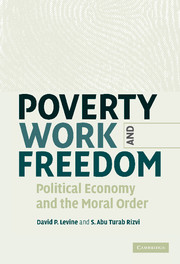1 - Introduction
Published online by Cambridge University Press: 22 September 2009
Summary
What is the essential thing that we lack when we are poor? Answers to this question often refer to a set of goods, basic needs, or a minimum level of income. Despite their differences, these concepts all connect to a long-standing tradition of thinking in political economy that emphasizes the idea of subsistence. The idea of poverty as the lack of subsistence has played a central role in political economy since the first pages of the Wealth of Nations, where Adam Smith distinguishes between what he calls the civilized and savage states of man on the basis of the “abundance or scantiness” of the supply of the “necessities and conveniences of life” annually consumed.
However straightforward we might imagine this idea to be, even for the classical economists it turned out to involve complexities. Thus, we find the classical theorists using the term subsistence in two significantly different senses (see Levine 1998: ch. 1). According to the first, subsistence refers to needs associated with maintaining the physical integrity of the human organism, natural needs of human beings considered part of a natural order. According to the second, subsistence refers to needs associated with a culturally and historically determined way of life. The first account makes poverty a threat to the organism's physical survival; the second makes it a threat to its cultural survival. The two threats need not, of course, be entirely separate matters.
- Type
- Chapter
- Information
- Poverty, Work, and FreedomPolitical Economy and the Moral Order, pp. 1 - 10Publisher: Cambridge University PressPrint publication year: 2005



